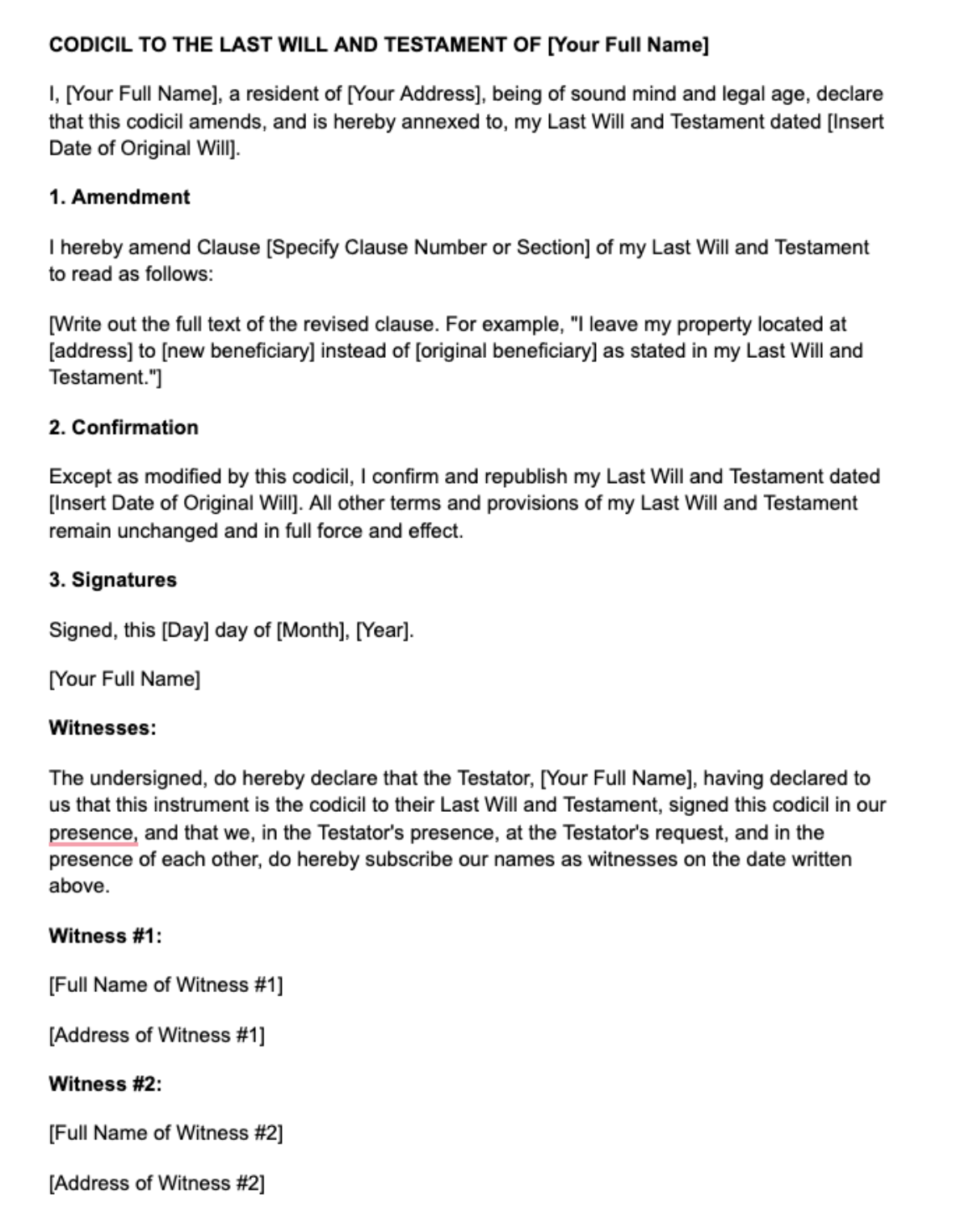Estate Settlement
Dec 04, 2024
How to Stop Mail for a Deceased Person: 5 Steps
Learn how to stop mail for a deceased person with our 5-step guide to protect their identity and ease estate management.
Discover the legal requirements for a valid will in California. From signatures to witnesses, we break down the key elements for you


Executing a will in California requires meeting specific legal requirements. The testator must be at least 18 years old, of sound mind, have a written will, and sign it in front of two witnesses. This guide breaks down each step to ensure your will is legally valid.
From understanding the basic requirements of a valid will, through the specifics of holographic wills and the role of witnesses, to the process of altering a will, this guide covers it all.
Whether you're an executor or an estate planner, this guide will equip you with the tools you need to confidently navigate estate planning and probate in California.
Under California Probate Code §6100, a will is only legally valid if it follows specific rules. The testator must meet eligibility criteria, the document must be properly drafted, and signatures must comply with legal standards. Below, we break down each requirement in detail.
In California, a testator must be at least 18 years old to create a valid will. This ensures they are legally capable of making significant decisions regarding their estate.
They must also be of sound mind, meaning they understand that the will determines how their assets will be distributed after death. Additionally, they should be aware of their property’s value and their relationship to their heirs, such as a spouse or children.
In California, a valid will must be in writing, meaning it must exist in a physical, tangible form. This requirement ensures clarity, authenticity, and enforceability under California Probate Code §6110. A will that is not written—such as an oral will or a digital document without proper execution—will not be recognized in court.
There are two primary types of written wills in California:
Formal wills: These are typically typed and printed, then signed by the testator in the presence of two witnesses.
Holographic wills: These are handwritten and signed by the testator without the need for witnesses.
In California, digital copies, such as PDFs saved on a computer, scanned documents, or oral declarations, are not considered legally valid wills. A valid will must be physically written, signed, and meet the formal legal requirements outlined in California Probate Code §6110 (for typed wills) or §6111 (for holographic wills).
Here are the best practices for ensuring your will holds up in court
Use a formal will whenever possible to avoid legal challenges.
Include a self-proving affidavit (notarized statement from witnesses) to streamline probate.
Regularly update your will to reflect major life changes like marriage, divorce, or new children.
A valid will in California must be signed by the testator. If the testator is physically unable to sign, another person may sign on their behalf, but only in the testator’s presence and under their explicit direction. This ensures the will authentically represents the testator’s final wishes and prevents claims of forgery or coercion.
The signing of the will must be witnessed by at least two individuals. These witnesses must:
Be physically present at the same time during the signing of the will or the testator’s acknowledgment of their signature or the will itself.
Clearly recognize that the document being signed is the testator’s legal will.
Provide verification of the will’s authenticity, making it significantly harder to contest in probate court.
A will can be declared invalid if its execution or revocation was procured by duress, menace, fraud, or undue influence. As an executor or estate planner, it's important to ensure that the testator is making or had made their will freely and without any form of coercion.
A holographic will is a handwritten will that is entirely written, dated, and signed by the testator without the need for witnesses. Recognized under California Probate Code §6111, this type of will is often used in emergency situations, such as when an individual is near the end of their life and lacks access to legal assistance for drafting a formal will.
Unlike traditional wills, which require witnesses, a holographic will is considered valid as long as the testator’s handwriting and intent are clear. However, these wills carry a higher risk of legal disputes due to potential ambiguities, missing details, or conflicts with existing estate plans.
Yes, holographic wills are legally recognized in California.
While holographic wills are considered valid in California, It's important to note that while they are legal, they are typically seen as a last resort due to the potential complications they can present.
To ensure your holographic will is legally sound in California, it must meet the following requirements as per California Probate Code §6111(a):
Authenticity: Holographic wills can be contested due to doubts about the authenticity of the handwriting or signature, or if there are suspicions of forgery.
Completeness: Without the guidance of a legal professional, holographic wills may be incomplete or unclear, potentially leading to disputes among beneficiaries.
Proof of Sound Mind: Since holographic wills do not require witnesses, proving that the testator was of sound mind at the time of writing can be difficult, potentially leading to legal challenges.
The Bottom Line
Holographic wills are a valid, albeit less reliable, method of estate planning in California. Due to the potential challenges they present, it's advisable to consult with a professional for estate planning needs.
While a holographic will is better than having no will at all, a professionally drafted legal will can provide peace of mind knowing that your wishes will be clearly communicated and legally upheld.
Why Witnesses Are Crucial for a Will’s Legality
Witnesses serve as a critical safeguard in the will creation process. They confirm the testator's mental capacity and free will at the time of signing, providing a layer of protection against claims of fraud or coercion. In California, any generally competent person can act as a witness, but it's recommended to use adults to avoid potential competence issues (California Probate Code §6112(a)).
Why You Should Choose Disinterested Witnesses for Your Will
Ideally, witnesses should have no financial stake in the will, making them "disinterested." This ensures their testimony is unbiased. If a beneficiary witnesses a will, they're considered an "interested witness," which can lead to their gift being invalidated due to a presumption of undue influence (California Probate Code §6112(b)).
When an Interested Witness Can Still Inherit
Interestingly, if a will is witnessed by three people, including one interested witness and two disinterested witnesses, the presumption of undue influence does not apply.
The interested witness retains their gift in this case (California Probate Code §6112(c)).
In conclusion, while anyone generally competent can witness a will, choosing disinterested parties is a safer bet.
Life is a dynamic journey, and changes are inevitable. As an executor, you may encounter situations where the testator has altered their will to accommodate life changes such as marriage, divorce, or the birth of a child. It's crucial to understand that a will can be updated, modified, or amended at any time during the life of the testator.
There are two primary ways a testator can change a will in California: through a codicil or by creating a new will.
A codicil is a legal amendment to an existing will, used for minor modifications such as updating beneficiaries, appointing a new executor, or modifying specific bequests. Under California Probate Code §6121, a codicil must meet the same legal requirements as the original will, including written documentation, the testator’s signature, and the presence of two witnesses.

** Pictured above is a sample of a codicil to a will, and is used for educational purposes only**
A will can be revoked by either creating a new will or physically destroying the old one. If a new will is made, it should follow all legal requirements of a valid will. Physical destruction, such as burning or tearing, must be done intentionally to revoke the will, as specified under California Probate Code §6121.
As an executor, your role is to ensure the most recent and valid will is used in the probate process. If a codicil or new will appears, you must verify its authenticity and legal compliance. In case of conflicting documents, consulting a probate attorney is highly recommended.
In conclusion, understanding changes to a will and their legal implications is crucial for an executor. It ensures a smooth probate process and accurate distribution of the testator's assets.
In wrapping up, understanding the intricacies of estate planning and the requirements for a valid will in California is imperative for estate planners and executors.
A valid will is essential in ensuring that the deceased's last wishes are honored and that their estate is distributed according to their intentions. This involves paying meticulous attention to the testator's age, mental competency, the necessity of witnesses, proper documentation, and the specifics regarding holographic wills and alterations to a will.
As an executor, the responsibility of verifying the validity of the will and any alterations, as well as navigating the probate process, falls on your shoulders. This is a critical role, and expert advice can be invaluable in ensuring a smooth probate process.
For estate planners, creating a comprehensive and legally sound estate plan requires in-depth knowledge of estate laws and regulations. A well-drafted estate plan provides peace of mind, knowing that your client's wishes will be clearly communicated and legally upheld.
Given the complexities of estate laws, seeking professional legal counsel is highly advisable.
If you are an executor dealing with probate, we invite you to book a free consultation with us for expert guidance and support throughout the probate process.
Similarly, if you are an estate planner looking to create a comprehensive and legally robust estate plan, we are here to assist you. Schedule a free consultation with our experienced team for expert advice and support in estate planning.
If you die without a will in California, your estate is distributed based on intestate succession laws. This means your assets go to your closest relatives, starting with your spouse and children.
To make a valid will in California, you must be at least 18, of sound mind, put it in writing, and have two witnesses sign it. Notarization is not required.
No, a will in California does not need to be notarized to be valid. However, notarizing a "self-proving affidavit" can help simplify the probate process.
A valid will in California must be written, signed by the testator, and witnessed by two people. Holographic (handwritten) wills are allowed if they meet specific conditions.
Yes, you can write your own will in California. It must be in writing, signed, and witnessed properly to be legally valid.
 Simplify Probate Today
Simplify Probate Today
Get expert guidance from our specialists who've helped 10,000+ families.
Book a free consultation